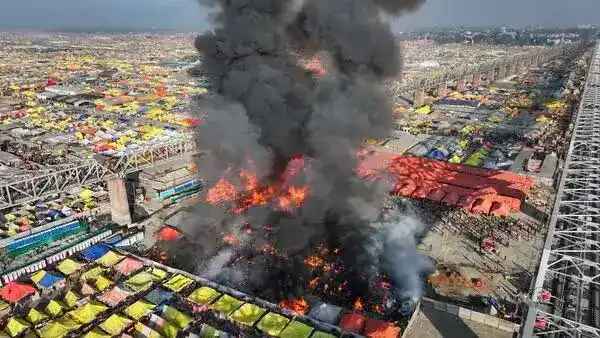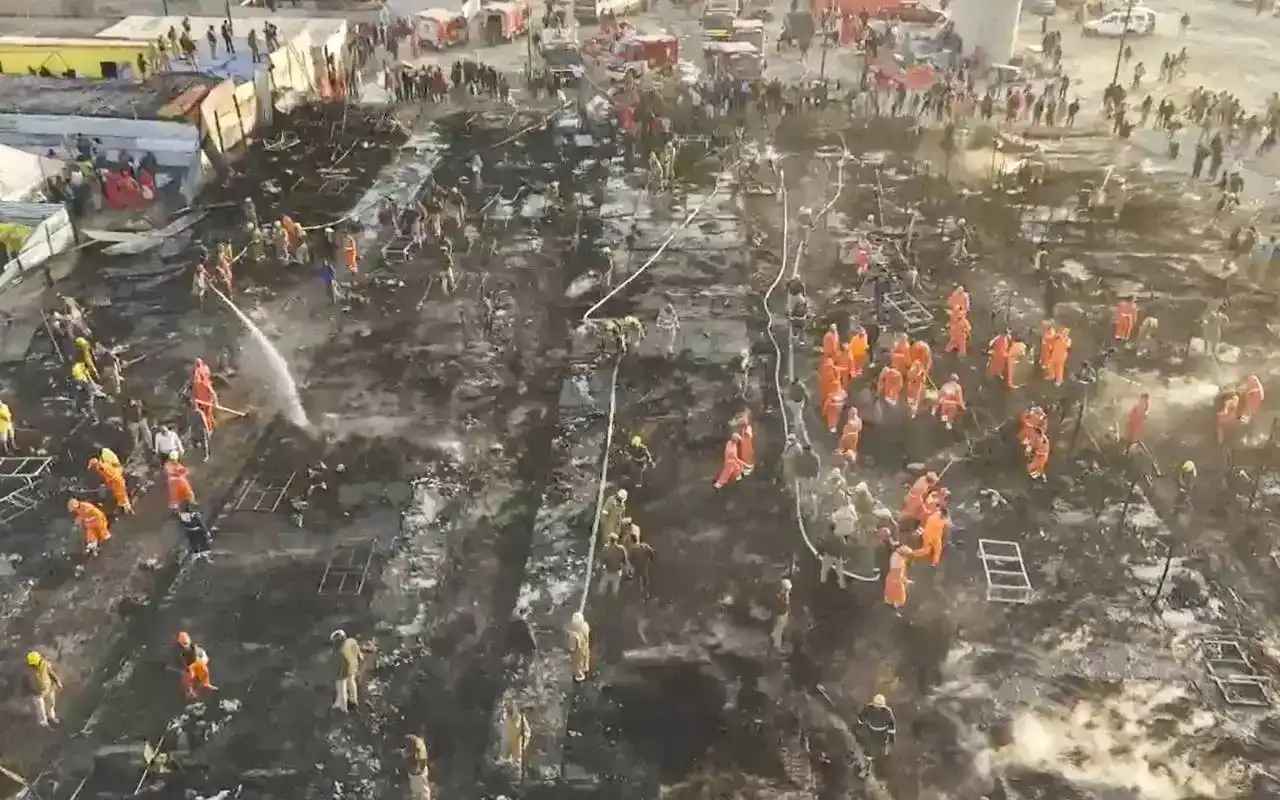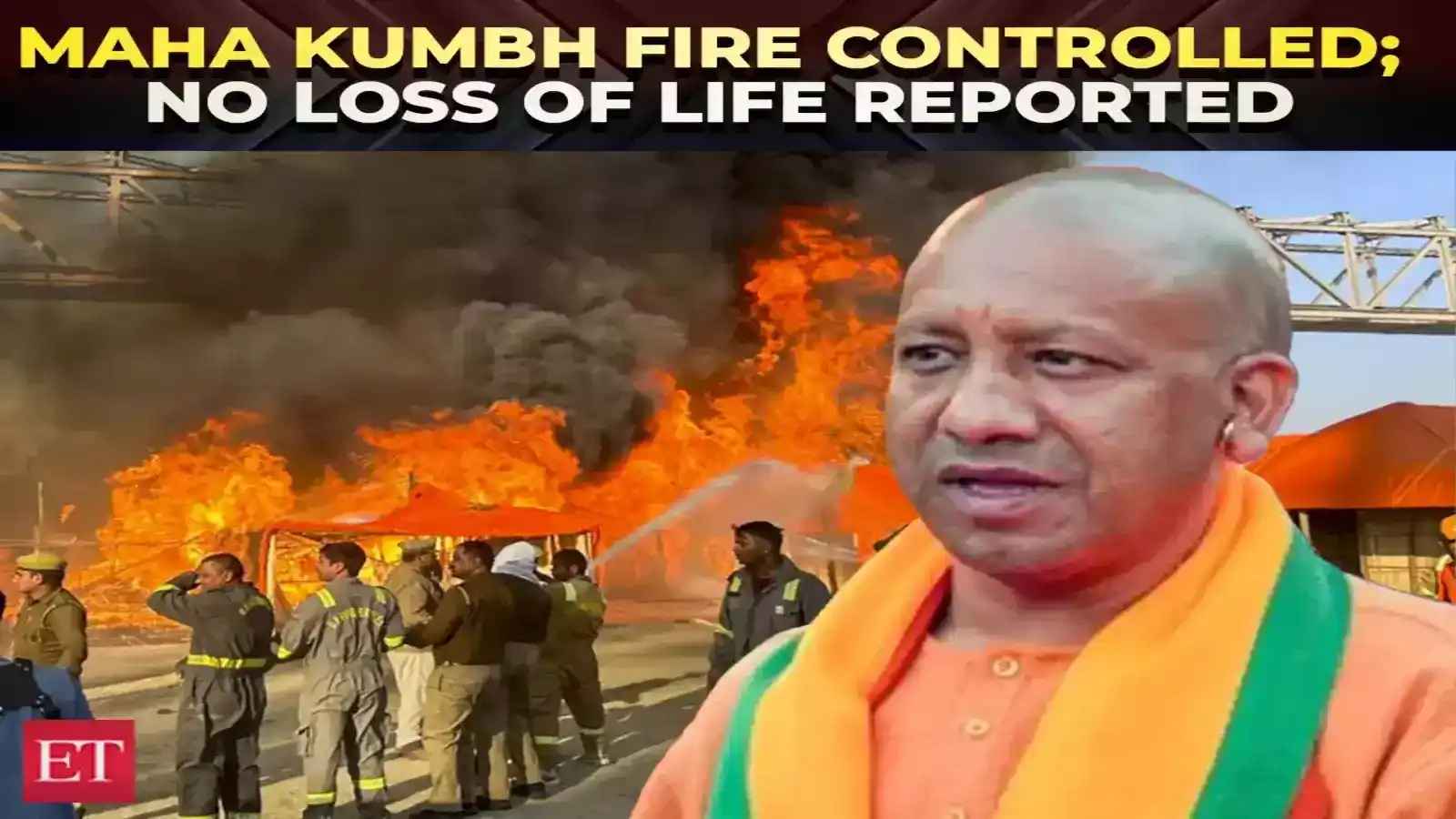Fire Incident at MahaKumbh Mela 2025: Prayagraj Update
Updated on : 20 January, 2025

Image Source: google.com
The Maha Kumbh Mela, held every 12 years in Prayagraj, Uttar Pradesh, is one of the largest religious gatherings in the world. In 2025, this sacred festival was marred by a tragic fire incident that raised numerous concerns about safety and emergency preparedness at such large-scale events. Our blog on Hexahome provides an in-depth look at the festival, including its significance and the latest updates. This analysis will delve into the fire accident that occurred on January 19, 2025, detailing its causes, impacts, and the responses from authorities. For more insights and information about the Maha Kumbh Mela 2025.
Introduction to the Maha Kumbh Mela
The Maha Kumbh Mela is a monumental religious festival celebrated by Hindus every 12 years at four different locations in India: Prayagraj, Haridwar, Ujjain, and Nashik. The festival attracts millions of pilgrims seeking spiritual purification through ritual bathing in sacred rivers. The 2025 edition began on January 13 and is expected to last until February 26, drawing an estimated 400 million attendees over its duration.
The significance of the Kumbh Mela lies in its rich cultural heritage and deep spiritual roots, symbolizing unity among diverse communities as they come together for a common purpose—seeking divine blessings and liberation from sins.
Popular Blogs
Overview of the Fire Incident
On January 19, 2025, around 4 PM IST, a devastating fire erupted in Sector 19 of the Maha Kumbh Mela area due to an LPG cylinder explosion inside a tent used by Gita Press for their operations during the festival. The flames quickly spread to adjacent tents, creating chaos among thousands of devotees present in the vicinity.
Despite the alarming nature of the incident, prompt action by emergency services ensured that no casualties were reported. However, the event raised serious concerns regarding safety protocols at such a massive gathering.
Timeline of Events
| Time | Event Description |
|---|---|
| 4:00 PM | An LPG cylinder explodes in a tent belonging to Gita Press. |
| 4:05 PM | Flames engulf nearby tents; thick smoke fills the area. |
| 4:10 PM | Emergency services are alerted; evacuation begins immediately. |
| 4:30 PM | Firefighters bring the blaze under control after intense efforts. |
| 5:00 PM | Authorities initiate damage assessment and investigation into causes. |
This timeline illustrates how swiftly events unfolded, highlighting both the rapid escalation of danger and the effective response that followed.
Cause of the Fire
The fire was primarily caused by an explosion from an LPG cylinder inside a tent used by Gita Press for selling religious literature and materials during the festival. Initial investigations suggest that improper handling or maintenance of the cylinder may have contributed to the explosion.
Detailed inquiries are underway to ascertain whether negligence played a role or if there were technical faults with the equipment used for cooking or heating within these temporary structures.
Impact on Tents and Property

Image Source: google.com
The fire resulted in substantial property damage:
- Approximately 18 tents were completely destroyed.
- Personal belongings, including clothing, religious texts, and other valuables belonging to pilgrims and vendors, were lost.
- The Gita Press tent sustained significant losses due to inventory destruction.
While no injuries or fatalities were reported, this incident underscored vulnerabilities associated with temporary structures housing large numbers of people during major events.
Emergency Response and Evacuation
The emergency response was commendable:
- Firefighting Teams: Over 15 fire tenders were dispatched promptly to combat the flames.
- Evacuation Procedures: Local police and administrative officials acted quickly to evacuate nearby tents and ensure that pilgrims moved away from danger zones.
- Medical Preparedness: Medical teams were stationed nearby to provide immediate assistance if needed.
The rapid response minimized potential casualties and demonstrated effective coordination among various emergency services.
Role of Authorities in Containing the Fire
Authorities played a crucial role in managing this crisis:
- The police ensured crowd control amidst rising panic among devotees.
- Firefighters worked tirelessly to contain and extinguish the flames quickly.
- Chief Minister Yogi Adityanath conducted an aerial survey of the affected area to assess damage firsthand.
Their coordinated efforts not only contained the fire but also restored order during a chaotic situation.
For more details on the incident and ongoing updates, you can refer to the following external sources:
- Times of India: Maha Kumbh Mela 2025 Live Updates - Provides live updates and insights into the fire incident and its management.
- Zee Business: Fire at Maha Kumbh Mela - Details the fire incident and response efforts by authorities.
- Hindustan Times: Drone Footage of the Blaze - Features drone footage capturing the extent of the fire and emergency response.
- Economic Times: CM Yogi's Response - Discusses Chief Minister Yogi Adityanath's arrival and assessment of the situation.
Statements from Officials

Image Source: google.com
Following the incident, several officials made statements reflecting their commitment to safety:
- DIG Vaibhav Krishna remarked that "the fire has been brought under control," emphasizing ongoing investigations into its cause.
- Chief Minister Yogi Adityanath expressed his concern for public safety and assured that measures would be implemented to prevent such incidents in future gatherings.
These statements highlighted accountability among officials while reassuring attendees about their safety.
Safety Measures in Place at the Maha Kumbh Mela
Prior to this incident, various safety protocols had already been established:
- Deployment of fire trucks across key areas within the Mela grounds.
- An Integrated Command and Control Centre (ICCC) was operational for effective crowd management and surveillance.
- Regular inspections were conducted at cooking areas where LPG cylinders were utilized.
While these measures were beneficial during this incident, they also revealed areas needing improvement for future events.
Lessons Learned from the Incident
This unfortunate event serves as a critical learning opportunity:
- Stricter Regulations on LPG Usage: Enhanced checks on LPG cylinder installations should be enforced.
- Fire Safety Training: Volunteers working at these events must receive comprehensive training on fire safety protocols.
- Emergency Preparedness Drills: Regular drills should be conducted to prepare both staff and attendees for potential emergencies.
Implementing these lessons can significantly enhance safety at future gatherings.
Impact on Devotees and Pilgrims
While there were no physical injuries reported among attendees, many pilgrims experienced emotional distress due to witnessing such a frightening event:
- The evacuation process caused delays in rituals for some devotees who had planned specific ceremonies during their visit.
- Anxiety levels increased as crowds witnessed flames and smoke rising from nearby tents.
Despite these challenges, many devotees continued their spiritual practices with resilience, underscoring their commitment to faith even amid adversity.
Government's Response and Future Plans
In response to this incident, state authorities have committed to implementing stricter safety measures:
- Increased monitoring will be established in high-risk zones throughout future events.
- Additional firefighting resources will be deployed to ensure rapid response capabilities.
- A comprehensive review of existing disaster management plans will take place to identify potential gaps in safety protocols.
These proactive steps aim to enhance overall safety for future participants at large gatherings like the Maha Kumbh Mela.
Comparative Analysis: Past Incidents at Kumbh Melas
Historically, Kumbh Melas have faced various challenges:
| Year | Incident Type | Casualties/Impact |
|---|---|---|
| 2013 | Stampede | Over 36 dead; caused by overcrowding |
| 2001 | Tent Fire | Several tents destroyed; no casualties |
| 2025 | Cylinder Explosion | Property damage; no injuries or fatalities |
This comparative analysis highlights recurring issues related to crowd management and safety at such large-scale events, emphasizing a need for continuous improvement in planning and execution.
Environmental and Logistical Challenges
Managing millions of attendees presents unique challenges:
- Waste Management: The sheer volume of waste generated requires efficient disposal systems to maintain cleanliness around sacred sites.
- Fire Safety Infrastructure: Ensuring adequate firefighting resources across vast areas remains complex given fluctuating crowd sizes.
- Balancing Spiritual Practices with Modern Safety Protocols: It is crucial to respect traditional practices while incorporating modern safety measures seamlessly into event planning.
Addressing these challenges is essential for preserving both public safety and spiritual integrity during future gatherings.
Conclusion
The fire accident at Maha Kumbh Mela serves as a poignant reminder of the importance of robust safety measures during large-scale events like this sacred festival. While no lives were lost thanks to swift action by authorities, this incident underscores a critical need for continuous vigilance and improvement in disaster preparedness strategies.
As preparations continue for upcoming significant events within this massive religious festival, it is imperative that lessons learned are implemented effectively to ensure that all participants can engage safely in their spiritual journeys without fear or disruption.















